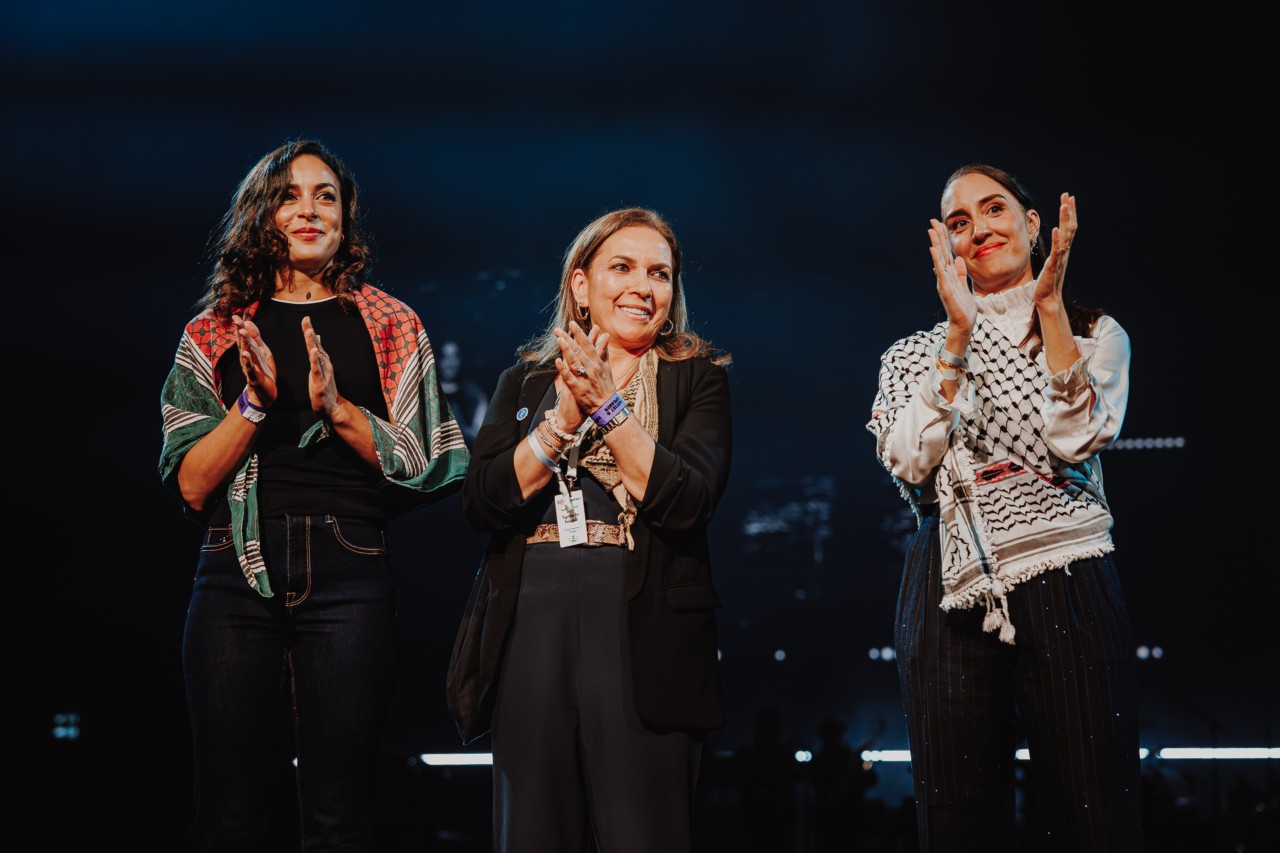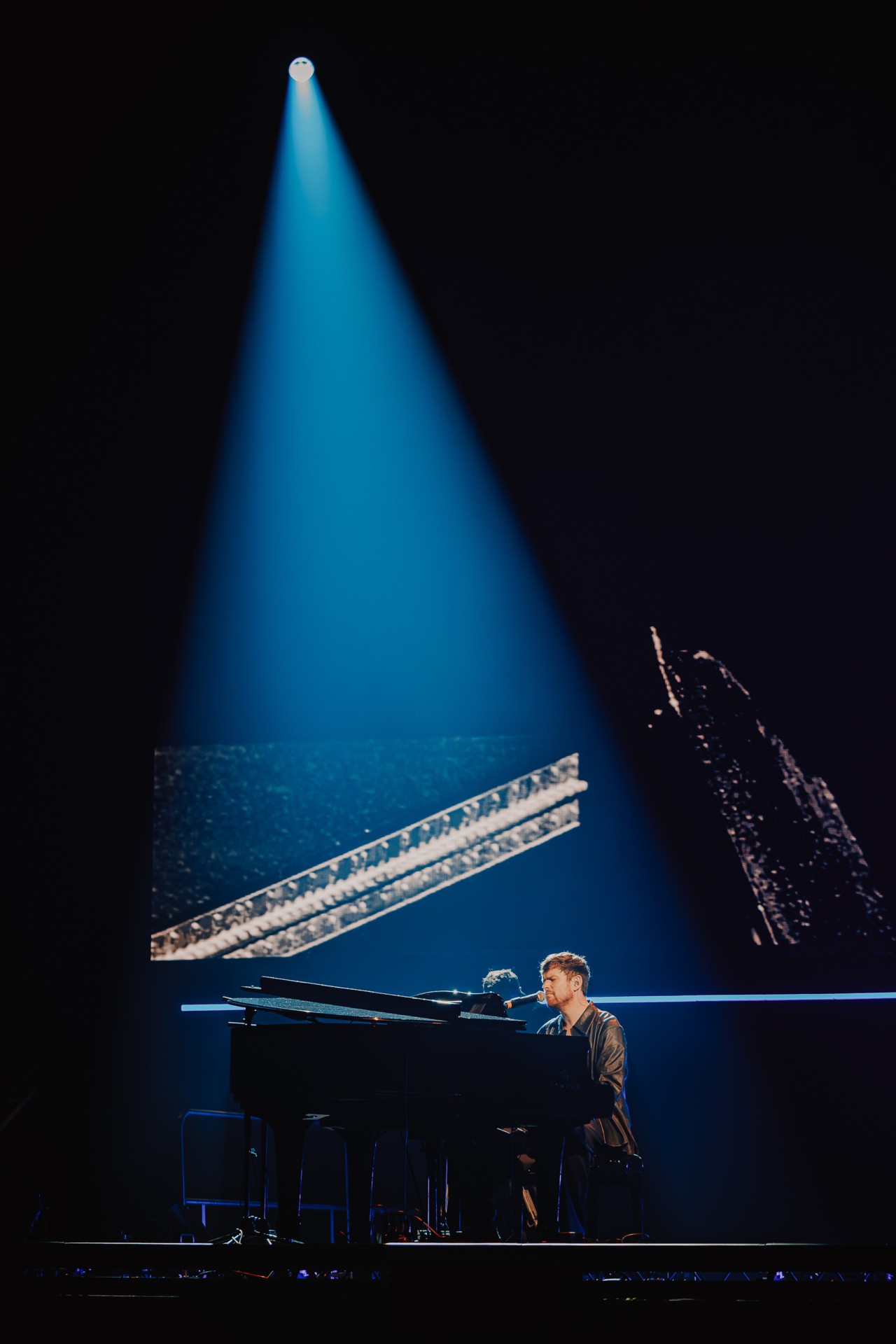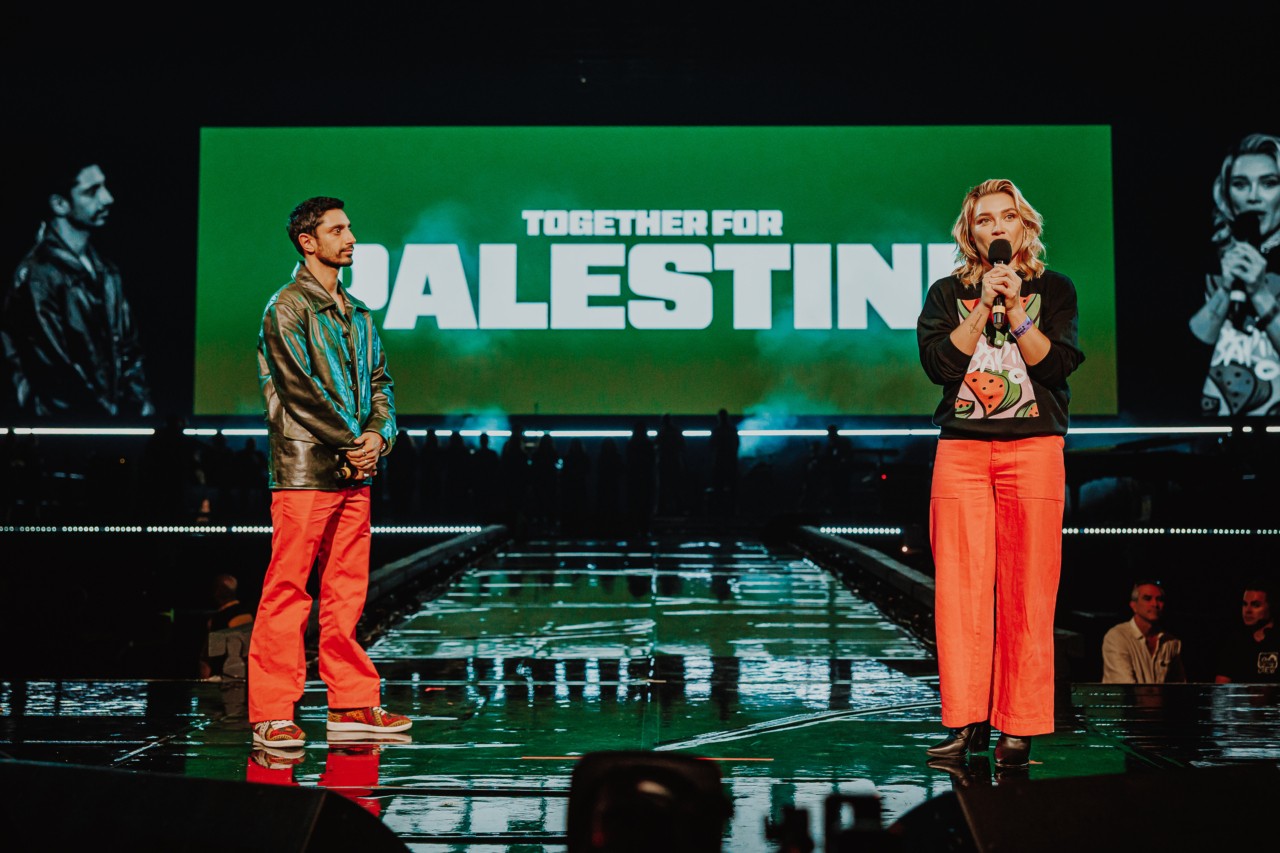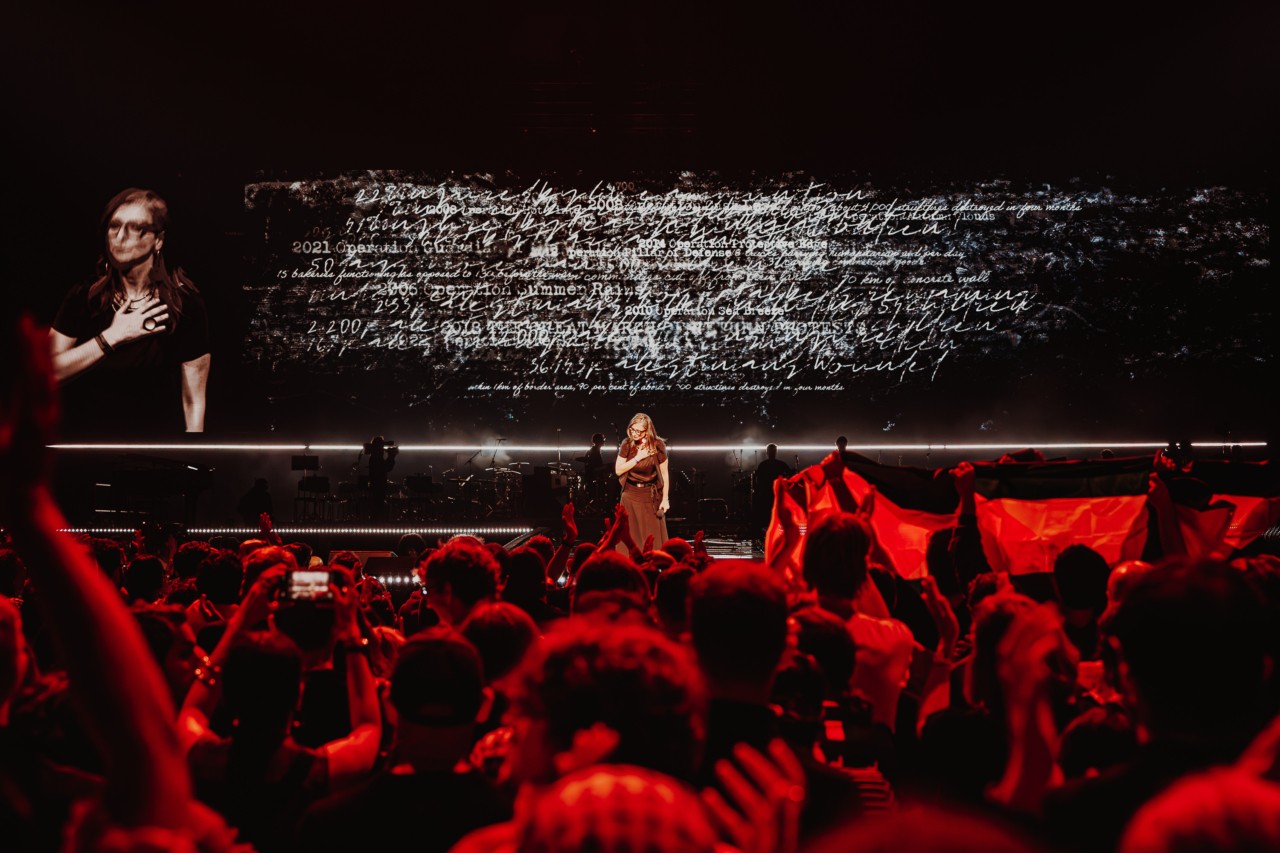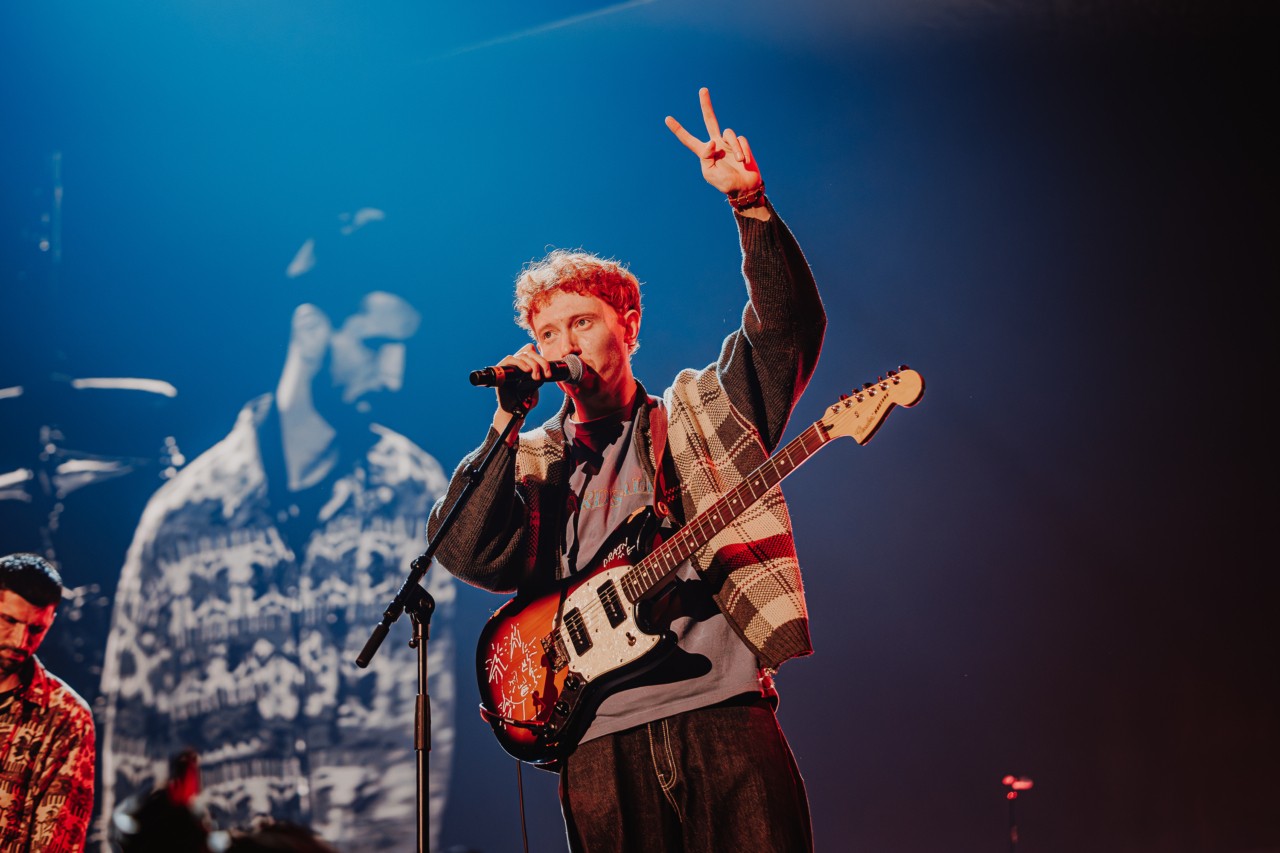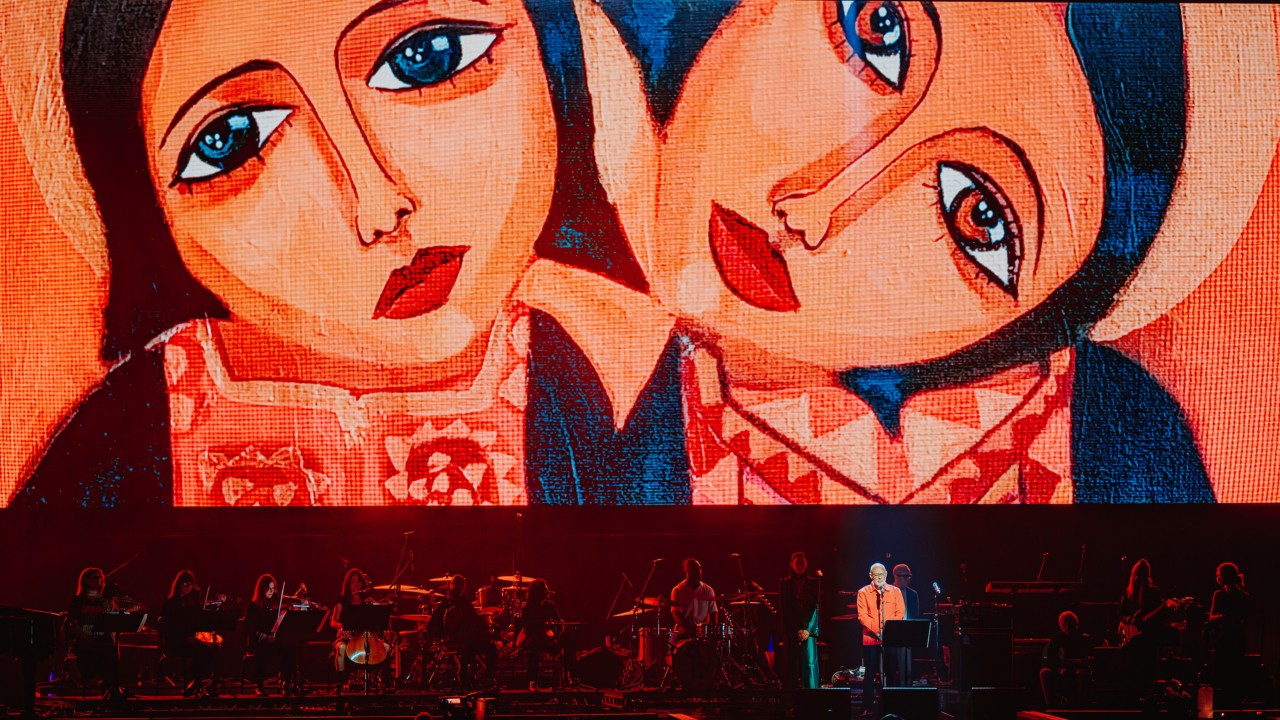
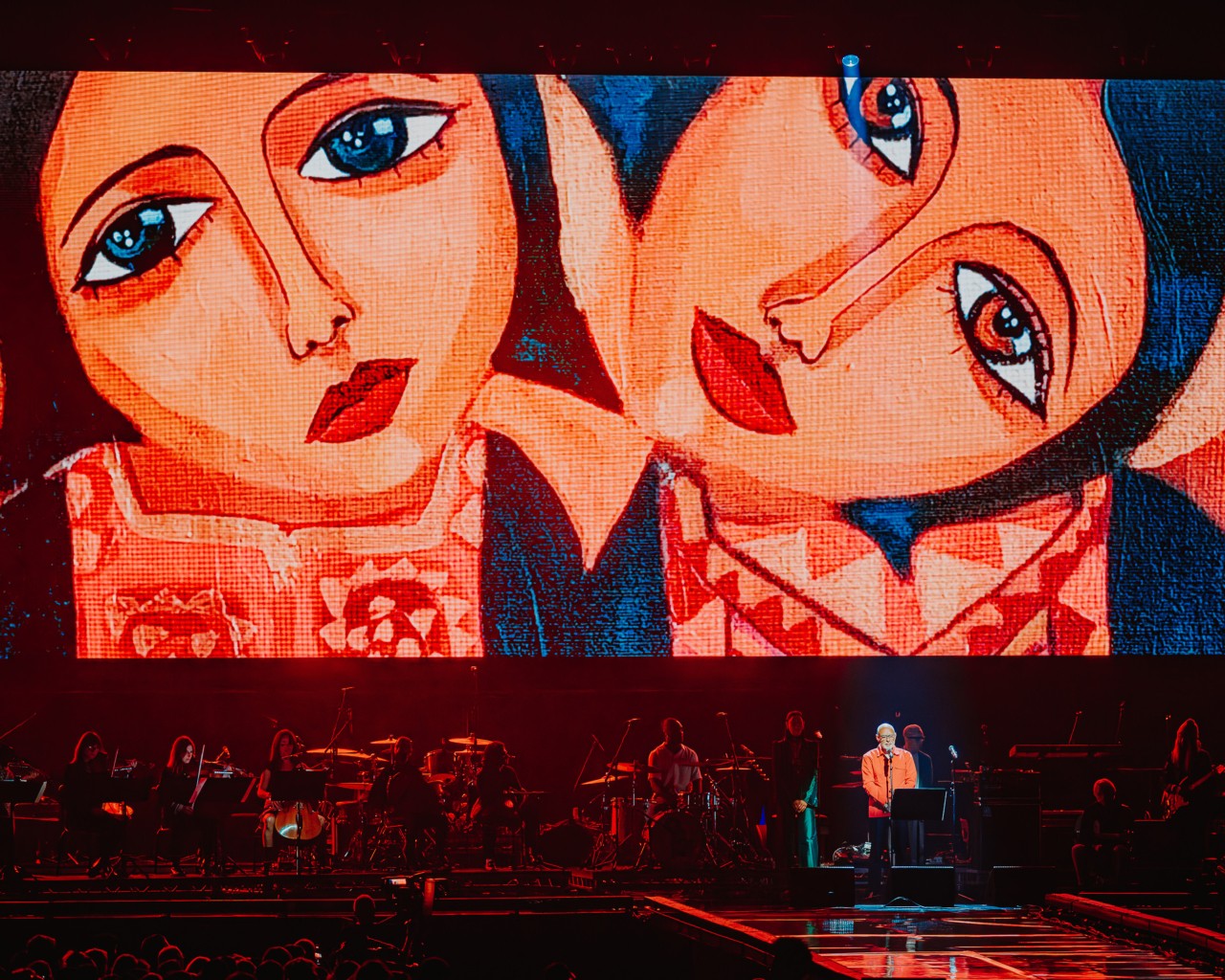
Words by Daphne Chouliaraki Milner
photographs by luke dyson
Wembley Arena, one of the largest stadiums in Europe, was packed last night. Tens of thousands filled the stands, waving Palestinian flags and holding banners aloft as artists, actors, and activists took the stage for Together for Palestine.
The benefit concert—organized by musician Brian Eno, film producer Tracey Seaward, actor Khalid Abdalla, and London Palestine Film Festival founder Khaled Ziada—was conceived as a cultural intervention as much as a fundraiser, uniting global stars like PinkPantheress, Florence Pugh, Louis Theroux, Elyanna, Munroe Bergdorf, and Saint Levant in a program carefully curated to blend music, visual art, and political urgency. All proceeds went to Palestinian-led groups working inside Gaza to deliver food, medical supplies, and urgent humanitarian care, including Taawon, the Palestine Children’s Relief Fund, and the Palestine Medical Relief Society.
Palestinian art held center stage through a program curated by Malak Mattar, who projected iconic works by Palestinian artists, including Suleiman Mansour, alongside pieces from younger and emerging artists. “I made sure that we honor my colleagues and the Palestinian visual artists that have been killed in the genocide,” she said. “[This concert] gives me hope, but at the same time, the weight of watching my family back home and my city and my [Gaza] Strip being reduced to rubble—it’s such a heavy weight. There will always be awe of my people and their bravery.”

Billed as a massive cultural act of solidarity, Together For Palestine carried a heavy backdrop.
Since the coordinated Hamas attack October 7, 2023, that killed 1,200 people at a music festival in Israel, Israel’s response—killing more than 53,000 Palestinians in fewer than two years, the vast majority civilians—has officially been named a genocide in a United Nations report released earlier this week. This annihilation is being carried out with mass civilian deaths, deliberate starvation, and the destruction of infrastructure needed for survival.
A joint investigation by The Guardian, +972 Magazine, and Local Call further revealed that among those killed by Israeli fighters, leaked Israeli military intelligence lists only 8,900 confirmed or “probable” Hamas and PIJ fighters among the dead. The figures show that civilians make up 83% of those killed: one of the highest civilian death rates in modern conflict.
“I joined last night to be able to say what words can’t anymore. I have run out of words to express the grief, anger, heartbreak, fear, and stress that I, like many others, have been feeling.”
For Palestinians and their allies, Together For Palestine doubled as a declaration of survival. “If you look at history, in most cases, Indigenous populations exposed to settler colonial movements disappear if they don’t preserve their cultures,” said Tareq Emtairah, director general of Taawon. “This concert is one way for us to preserve [ours] and to remind the world that our cause is justice.”
For many Palestinian performers, that act of preservation was a deeply personal one. “I joined [last night] to be able to say what words can’t anymore,” said musician Nai Barghouti. “I have run out of words to express the grief, anger, heartbreak, fear, and stress that I, like many others, have been feeling.” Barghouti said that working on her second album reminded her how music transforms isolation into connection, and grief into something collective and powerful. “I hope our message will inspire others to be vocal about Palestine and to join our journey towards freedom, justice, and equality,” she added.

Adnan Joubran echoed that sentiment, saying: “I’ve dedicated the past two decades of my career to advocating for our rights and sharing our rich culture with the world. Music, particularly with my brothers, became a powerful medium for me to contribute to the Palestinian cause. Participating in this concert is the least I could do as a musician, human, and Palestinian.”
But the evening also highlighted another dimension of survival: the climate costs of war. Humanitarian leaders stressed that Gaza’s devastation is also an environmental catastrophe.
The United Nations estimates the conflict has generated nearly 39 million metric tons of debris, leaving more than 22 pounds of rubble per square foot across the territory. “The amount of damage when you take a look at the rubble, the toxic effects of the bombing, how it affects the water, the air, the destruction of sewage systems and arable land—the crisis in Gaza is far, far more than a humanitarian or political crisis. It’s an environmental crisis, too,” said PCRF Chairwoman Vivian Rasem Khalaf.
“May people come and learn about the culture of Palestine beyond the stories only of tragedy. See the beauty in the music, the art, and the people there.”
Gaza was already facing a severe water shortage before Israel’s latest assault. Now, nearly 22 months of bombardment and ground operations have damaged more than 80% of the territory’s water infrastructure. What aid groups once described as a chronic problem is now being called an unprecedented water crisis, with residents forced to rely on contaminated wells, irregular water trucks, or brackish groundwater that doctors warn will cause kidney failure.
“Every environmental disaster has its root causes in social injustice,” said Emtairah. “In the confiscation of resources and the exploitation of resources at the expense of Indigenous population. And this is what we’re seeing in Palestine. War in itself is a major environmental disaster and a source of major climate impact.”
At Wembley, the themes of justice and survival extended beyond the stage, taken up by Palestinian organizers and echoed by international allies who cast the concert as part of a global movement for humanity. “I hope the concert reminds people that this is a movement of love and not hate,” said actor, activist, and Together For Palestine participant Jameela Jamil. “It is a day for humanity. For protecting innocent people who are being harmed on a livestream before our eyes on a daily basis. May people come and learn about the culture of Palestine beyond the stories only of tragedy. See the beauty in the music, the art, and the people there. May the day inspire people to keep learning, to keep leaning in and to keep supporting the dignity, freedom, and safety of the Palestinian people.”


But for the charities receiving support, the concert was also a call for sustained commitment—especially as the crisis deepens. Earlier this week, Israel launched a major ground invasion of Gaza City, backed by heavy air strikes. The assault killed dozens and forced tens of thousands to flee along a single coastal road, joining the hundreds of thousands already displaced.
“Unless we have solid partners committed for the long-term, we’re never going to be able to get what needs to get done in Gaza,” said Khalaf. “We need long-term commitment on a moral and ethical basis, not self-interest or short-term gain. We need to see the Palestinian catastrophe that has befallen us as one that has befallen humanity. What happened in Gaza can happen to any country at any time.”

As Israel Escalates in Gaza, Artists Rally for Survival and Justice at Together for Palestine Concert
